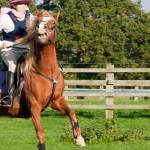Surgical Treatment for Headshaking Horses

Dental problems, an ear infection, the wrong bit, rough use of the rider’s hands…any of these can cause a horse to toss its head. Repeated headshaking, however, is a problem that interferes with a horse’s comfort and use, and is often quite difficult to overcome. Some horses that continually toss or shake their heads are thought to have a disorder of the infraorbital nerve, causing pain or discomfort. Dental correction and changes in bitting won’t fix the problem in these horses, and the behavior is so violent and disruptive that euthanasia is the only answer for some affected horses.
Various medications and treatments have been tried on headshaking horses, with less than universal success. A surgical treatment has been at least somewhat effective in a large percentage of headshaking horses. This option involves the insertion of a small platinum coil into the infraorbital canal in the horse’s face. Continuous pressure on the infraorbital nerve interrupts the nerve’s signal, blocking or limiting the source of discomfort.
Researchers at the University of Bristol reviewed the records of horses that had undergone caudal compression of the infraorbital nerve over a period of six years. The horses were of varied ages and had been used for disciplines such as jumping, dressage, eventing, and pleasure riding. In 35 of 58 horses, the procedure cured headshaking initially. However, the behavior returned as soon as nine months later and as long as 30 months later in nine of the horses. Eighteen months after surgery, the surgery was considered to be a success in half of the horses, some of whom had required a second surgery. Owners reported that many of the horses displayed nose rubbing after the treatment, but this behavior resolved in most of the horses as time passed. In four horses, nose rubbing did not resolve and these horses were euthanized.
Owners should not assume that a tiedown, martingale, or stronger bit will fix headshaking. An examination by a veterinarian is the best way to determine why a particular horse is shaking its head, rubbing its nose, or showing any behavior that may be caused by a physical problem.








